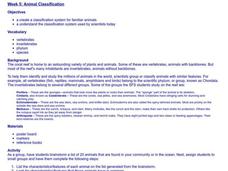Curated OER
Invertebrate Diversity
Comparative anatomy prevails in the lesson exploring diversity among invertebrates. Biologists examine physical characteristics of an earthworm from phylum annelida and a meal worm from phylum insecta. They also inspect a cricket and a...
New South Wales Department of Education
Invertebrates
Of all invertebrates, insects by far are the most numerous. Scholars discuss invertebrates and then use a key to classify them. They see different examples and must describe features of each organism based upon the key.
Jude Mphoweh
Vertebrates and Invertebrates
Spine or no spine? Vertebrate or invertebrate? Learners sort and classify a list of animals as vertebrates or invertebrates into a graphic organizer.
South Gloucestershire Council
Animal Classification: A Collaborative Sorting Activity for Key Stages 2 & 3
Introduce the logic behind a dichotomous key or administer a group performance assessment with a fun and challenging classification lesson. With explicit instructions for the teacher and for collaborative groups, as well as engaging...
Curated OER
Classification of Animals
This is one of the better presentations I've seen on the classification of animals. Youngsters view slides that introduce the characteristics of each of the animals groups through the use of photographs and text. Then, they are given...
Curated OER
Invertebrate Classification Challenge
Sixth graders practice invertebrate classification using the organisms that are discussed in their textbooks. In this classification lesson students work in teams to classify organisms.
Scholastic
Study Jams! Invertebrates
Stringed instruments play as viewers explore ocean invertebrates through nine nicely flowing slides. The captions describe the eight phyla: cnidaria, flatworms, roundworms, segmented worms, mollusks, arthropods,and enchinoderms. During...
Larson Lab
Animal Classification
How are animals classified? Scholars explore animal classification by observing non-living and living specimens. They learn how to organize animals into vertebrates and invertebrates and identify the five vertebrate groups: mammals,...
NOAA
Invertebrates
Crabs and lobsters ... yum! The 18th installment of a 23-part NOAA Enrichment in Marine sciences and Oceanography (NEMO) program focuses on invertebrate marine life. After the lecture slideshow, learners conduct an activity to sample...
Curated OER
Invertebrates
Students examine invertebrates. In this animal classification instructional activity, students discuss invertebrates and bilateral symmetry. They discuss the importance of horse shoe crabs in medical science.
Curated OER
Classification of an Invertebrate: Sponge
Students investigate the invertebrate sponge. In this invertebrates lesson plan, students observe the sponge, Grantia, using a dissecting microscope. Students answer questions about their observations and view six other invertebrates....
Curated OER
Invertebrates, No Backbone, No Problem
Third graders research an invertebrate, create a poster about it, then present it to the class.
Curated OER
Hunting Invertebrate Fossils in the Classroom
Students acquire a general knowledge of fossils and paleontology, the study of evidence of life in the past and identify the major invertebrate groups (phyla) commonly found in the fossil record.
Curated OER
Animal Classification
Third graders differentiate between vertebrates and invertebrates, and identify the main characteristics of mammals, fish, reptiles, amphibians, and birds. They sort and categorize different types of balls, discuss the characteristics...
Curated OER
Invertebrate Phyla
Young scholars explore the invertebrate phyla. They discuss the characteristics of the invertebrate Phyla in the Kingdom Animal. Students classify organisms into Phyla based on their characteristics. They distinguish radial symmetry,...
Curated OER
Diversity of Modern Life
Convey classification to your amateur biologists with this bright and bold presentation. After you introduce each kingdom, query your viewers with the included reinforcement questions. Since there are no photos of the different...
Curated OER
Appearances Are Deceiving
Young scientists study creeks around their area to see how clean the water really is. One way to tell is by the invertebrate populations that are present. This lesson introduces a game which learners simulate a variety of species found...
Curated OER
Echinoderms
Echinoderm structure and characteristics are the focus of this reading comprehension and labeling instructional activity. Attractive diagrams and ample information make this a suitable homework assignment for your biology buffs when...
Curated OER
Invertebrate Chordates
Most chordates are easy to identify because of the specific classification criteria of their phylum. But what about tunicates? Young scientists read a short explanation about why tunicates, or sea squirts, are considered to be members of...
Curated OER
Animal Classification
Students watch video and slide shows as an introduction to animals. They discuss classifications of animals while moving from most common to least common of the animals. Types of classifications includes herbivores/carnivores;...
Curated OER
Animal Classification
In this animal classification worksheet, students read for information and comprehension. In this fill in the blank and multiple choice worksheet, students answer five questions.
Curated OER
Creating a Classification System
Students create classification system for Arctic-dwelling animals, the Arctic hare in particular.
Curated OER
Animal Classification
Students list characteristics and features of animals found in their community. They then group the animals according to how they are similar and different and create names for each group. They then create a chart of their...
Curated OER
Ocean Creature Classification
Pupils develop a Taxonomic Key for marine invertebrates from pictures they are given after practicing together with common objects, such as shoes. They then compare their key to a provided Ocean Invertebrates Taxonomic Key.

























